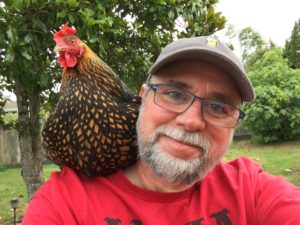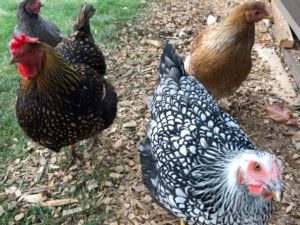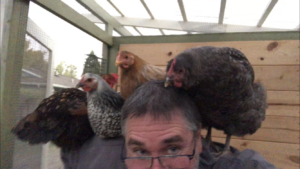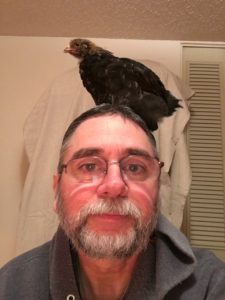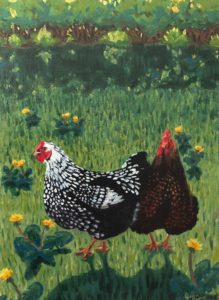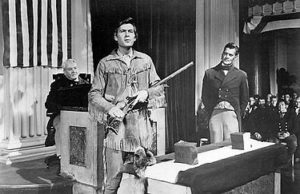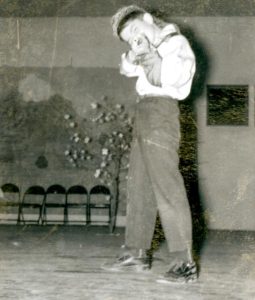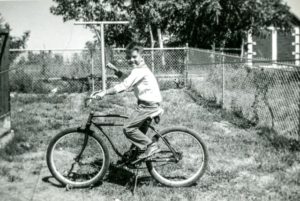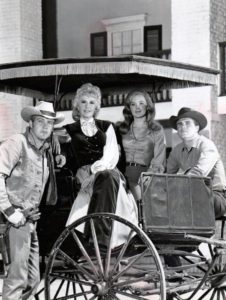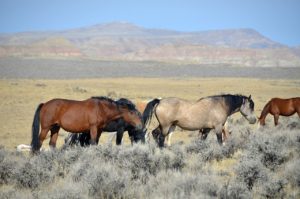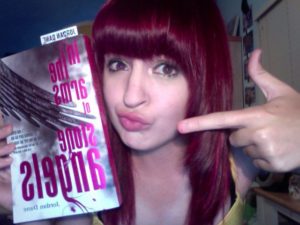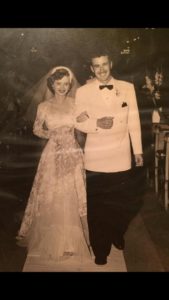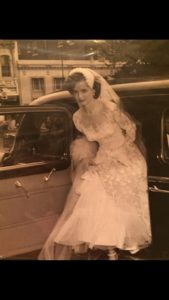Jordan Dane
@JordanDane

By Jeffrey Beall – Own work, CC BY-SA 3.0, https://commons.wikimedia.org/w/index.php?curid=21002061
For your reading enjoyment is another brave author open to feedback. My comments will follow. Feel free to share your constructive criticism in your comments. Let’s nurture this author, TKZers.
***
The words, sprayed in red, dripped like blood down the white siding of the ranch house on the corner. “They could have at least gotten the spelling right,” I called from the curb, loud enough for the woman in the yard, scattering grass seed from a coffee can, to hear.
Maggie looked up. She stood – a scarecrow with choppy, flaxen hair under a straw hat, worn jeans, and flannel shirt rolled to the elbow – and we looked at each other. She called toward the backyard: “June. We have company.”
A second woman approached along the slate flagstones that curved between a pansy-and-petunia border. Knee-length shorts and a Hawaiian shirt showed dimpled limbs and rose quartz skin. A halo of gray-flecked, light brown curls accented the cherub face. The tight line of her mouth loosened into something like a smile. Then her lips began to tremble and her eyelids flutter. She wrapped me in an airtight hug, which I returned with less vigor.
Maggie pressed June’s elbow. “June, get us some chairs. Can you sit a while, Kelly?”
They’d arrived two months before, in March, setting the block’s antenna twitching. Two single women, the wrong ages for mother and daughter, no men in sight. Sue Hoycheck said they seemed nice enough, but Sue was a kind-hearted grandmother who thought everyone seemed nice enough. They told Edie Isom they’d moved from St. Paul. One or the other –Edie couldn’t remember – had been hired to manage the art mall opening in the old Amtrak station downtown. When Olin Frey murmured that he’d seen just one bed – queen-size – come off the moving van, all the pieces fit together.
“It’s no big deal,” Lynn Franklin insisted. I’d come to Franklin’s Hardware to order specialty paints, coffee bean brown and French olive green, for a dining room trim. “As long as they return the rototiller they rented from us, who they sleep with is their own business.”
I smiled with mischief. “And if they don’t return the rototiller, who they sleep with is . . .?”
She frowned. “It may seem funny to you. You probably met a lot of them in New York. But around here . . .”
“I don’t know how many I met,” I said. “I’ll bet you don’t either.”
***
FEEDBACK
Overview: There is a lot for me to like in this intro. The inciting incident is a disturbance established with graffiti. It’s the first image the author draws our attention to. The idyllic setting is marred by red paint on the white siding of a ranch house. I particularly enjoyed the descriptions of the women. Very visual and easy to imagine. I also appreciated the underlying emotion in this scene when the visitor & the narrator console with a hug.
After I read and reread this intro, I noticed things that I would edit if this was my work. I had questions on POV and the characters as I read on. I sincerely enjoyed reading this intro. The talent of this author is very apparent, but some housekeeping is in order.
ESTABLISH GENDER: Since this is in first person, the gender of the narrator would be important as soon as possible from the start. This is minor, but add a word to this line:
I called from the curb, loud enough for the OTHER woman in the yard,…
Good call for the author to establish June’s name by having Maggie call out to her.
SENTENCE CLARITY: This is me, being nit picky. The sentence below might flow a little better:
BEFORE: “…loud enough for the woman in the yard, scattering grass seed from a coffee can, to hear.”
AFTER: “…loud enough for the other woman in the yard to hear as she scattered grass seed from a coffee can.”
STICK WITH ONE POV – If this scene is told from June’s singular POV, the intro should consistently be seen through her eyes. In the second paragraph, when Maggie looks up at June, this line follows”
and we looked at each other
I would suggest that the author stay in June’s head and try to imagine what she might see in Maggie’s eyes – worry, fatigue, hurt, concern, wariness? Or simply change the line to: “When my eyes fixed on Maggie’s, something passed between us.”
Another line switches the POV from June to Maggie: Maggie pressed June’s elbow. If this is truly meant for June’s POV, this line would read: Maggie pressed my elbow.
In paragraph 5, that begins with “They’d arrived two months before…”, the author switches from June’s POV to telling a “THEY” story. The POV should be consistent throughout this intro scene, so that line might read “I had moved with Maggie two months ago…”
But from this writing, maybe June and Maggie aren’t the “they” the author is writing about. Perhaps the author is writing about Kelly and her significant other. It’s not explained who Kelly is or why June is reticent to embrace her. By the time I got down to reading Lynn Franklin’s lines, I realized the hardware store owner was talking to June, as if June was an insider to the town. Some clarity is definitely needed.
If June and Maggie are the newcomers, other lines should be fixed for POV as follows:
BEFORE: Two single women, the wrong ages for mother and daughter, no men in sight. Sue Hoycheck said they seemed nice enough, but Sue was a kind-hearted grandmother who thought everyone seemed nice enough. They told Edie Isom they’d moved from St. Paul. One or the other –Edie couldn’t remember – had been hired to manage the art mall opening in the old Amtrak station downtown. When Olin Frey murmured that he’d seen just one bed – queen-size – come off the moving van, all the pieces fit together.
AFTER: We were two single women, the wrong ages for mother and daughter, no men in sight. Sue Hoycheck told others that we seemed nice enough, but Sue was a kind-hearted grandmother who thought everyone seemed nice enough. Word spread through town busy body, Edie Isom. It didn’t take long for folks to know Maggie and I hailed from St. Paul. Edie didn’t remember which one of us had been hired to manage the art mall opening in the old Amtrak station downtown, but I guess that didn’t matter much. But what set the town on fire came when Olin Frey murmured that he’d seen just one bed – queen-size – come off the moving van. That’s when all the pieces fit together for folks with small minds.
But if the “they” is Kelly and her partner or wife if they are married (unsure of the time period of this piece), then “they” should be explained with names.
EMBEDDED DIALOGUE – I would recommend to draw out dialogue lines so they are not embedded within a paragraph. It allows the reader to follow more easily and keep track of who is speaking.
The words, sprayed in red, dripped like blood down the white siding of the ranch house on the corner.
“They could have at least gotten the spelling right,” I called from the curb, loud enough for the woman in the yard to hear as she scattered grass seed from a coffee can.
Maggie looked up. She stood – a scarecrow with choppy, flaxen hair under a straw hat, worn jeans, and flannel shirt rolled to the elbow. When my eyes fixed on hers, something passed between us. She nudged her head and called toward the backyard.
“June. We have company.”
TIGHTEN SENTENCES WHERE NECESSARY: In the BEFORE line below, if the visitor’s lips are “beginning to tremble”, they are already trembling. A cleaner sentence would be:
BEFORE: Then her lips began to tremble and her eyelids flutter.
AFTER: Her lips trembled and her eyelids fluttered.
SHOW TIME LAPSE: When the dialogue line “It’s no big deal…” comes up, time has passed and June has left Maggie & Kelly or it’s another day or a memory. It would be nice to clarify this and I changed the flow a little in the AFTER example.
BEFORE: “It’s no big deal,” Lynn Franklin insisted. I’d come to Franklin’s Hardware to order specialty paints, coffee bean brown and French olive green, for a dining room trim. “As long as they return the rototiller they rented from us, who they sleep with is their own business.”
I smiled with mischief. “And if they don’t return the rototiller, who they sleep with is . . .?”
She frowned. “It may seem funny to you. You probably met a lot of them in New York. But around here . . .”
AFTER: Two hours later, I stared at the weary face of Lynn Franklin, owner of the local hardware store in town. I’d come to Franklin’s Hardware to order specialty paints, coffee bean brown and French olive green, for a dining room trim.
“It’s no big deal,” Lynn Franklin insisted. “As long as they return the rototiller they rented from us, who they sleep with is their own business.”
I smiled with mischief. “And if they don’t return the rototiller, who they sleep with is . . .?”
She frowned.
“It may seem funny to you. You probably met a lot of them in New York. But around here . . .”
“I don’t know how many I met,” I said. “I’ll bet you don’t either.”
SUMMARY: I really like how this ends. If the author adds clarity on the areas I brought up, the conflict is apparent, but I’m wondering where this will go and if it’s enough for a whole novel. The characters intrigue me. I would read on.
DISCUSSION:
1.) What changes would you recommend, TKZers? Would you read on?
2.) What possible plot twists can you see stemming from this introduction?


